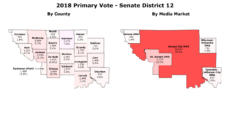Hundreds of Missouri schools and libraries are receiving pandemic funds to combat the digital divide from the Federal Communications Commission (FCC).
The FCC’s Emergency Connectivity Fund Program awarded more than $5 million in funding to more than 430 Missouri applicants so far, enabling them to invest in computers, tablets, Wi-Fi, and broadband access.
The money is devoted to supporting off-campus learning amid the COVID-19 pandemic.
“This new round of funding will connect even more students and library patrons with new tools for online learning and communicating with teachers in our ongoing work to close the homework gap,” said Acting Chairwoman Jessica Rosenworcel. “Together with the Emergency Broadband Benefit Program, the commission is investing more than $10 billion to support America’s critical broadband needs.”
More than 5,470 schools, 461 libraries, and 49 consortia have been awarded the grant, covering nearly 8 million students in every state and territory, according to the FCC. Around 60 percent of the total applications have been processed thus far.
A second round of applications closes Wednesday. More than 1,130 of the 44,500 total applications came from Missouri entities.
The commission has committed more than $2 billion of its $1.1 trillion fund so far.
The FCC’s Emergency Broadband Benefit Program, meanwhile, allows a discount of up to $50 per month on internet service for households in which a resident is at or below 135 percent of the federal poverty line or participates in certain care assistance programs.
Missouri hospitals are also benefiting from FCC technology grants: SMM Health St. Louis and the Health Care Collaborative of Rural Missouri were awarded more than $914,000 and $285,000, respectively, through the commission’s COVID-19 Telehealth Program.
State and federal investments in bridging the digital divide abound. A $400 million investment from the American Rescue Plan Act is said to be the largest in Missouri’s history, while the Missouri Association of Councils of Government (MACOG) will handle a $600,000 investment from the U.S. Department of Commerce announced last month.
The Department of Elementary and Secondary Education also planned to dedicate a portion of its American Rescue Plan Elementary and Secondary School Emergency Relief (ARP ESSER III) allocation to address the digital divide. Only 25 percent of the state’s schools were able to operate on a fully remote basis at the height of the pandemic, according to the department.
The House Special Interim Committee on Broadband Development is considering ways to invest the influx of funds into Missouri’s network with input from educators, advocacy groups, and service providers. It will submit a report with proposals and best practices to the General Assembly at the end of the year.

Cameron Gerber studied journalism at Lincoln University. Prior to Lincoln, he earned an associate’s degree from State Fair Community College. Cameron is a native of Eldon, Missouri.
Contact Cameron at cameron@themissouritimes.com.






























